2002 North Main Street
Santa Ana, California 92706
TEL: 714.567.3600
Raising Flags: The Stars and Stripes of the Bowers
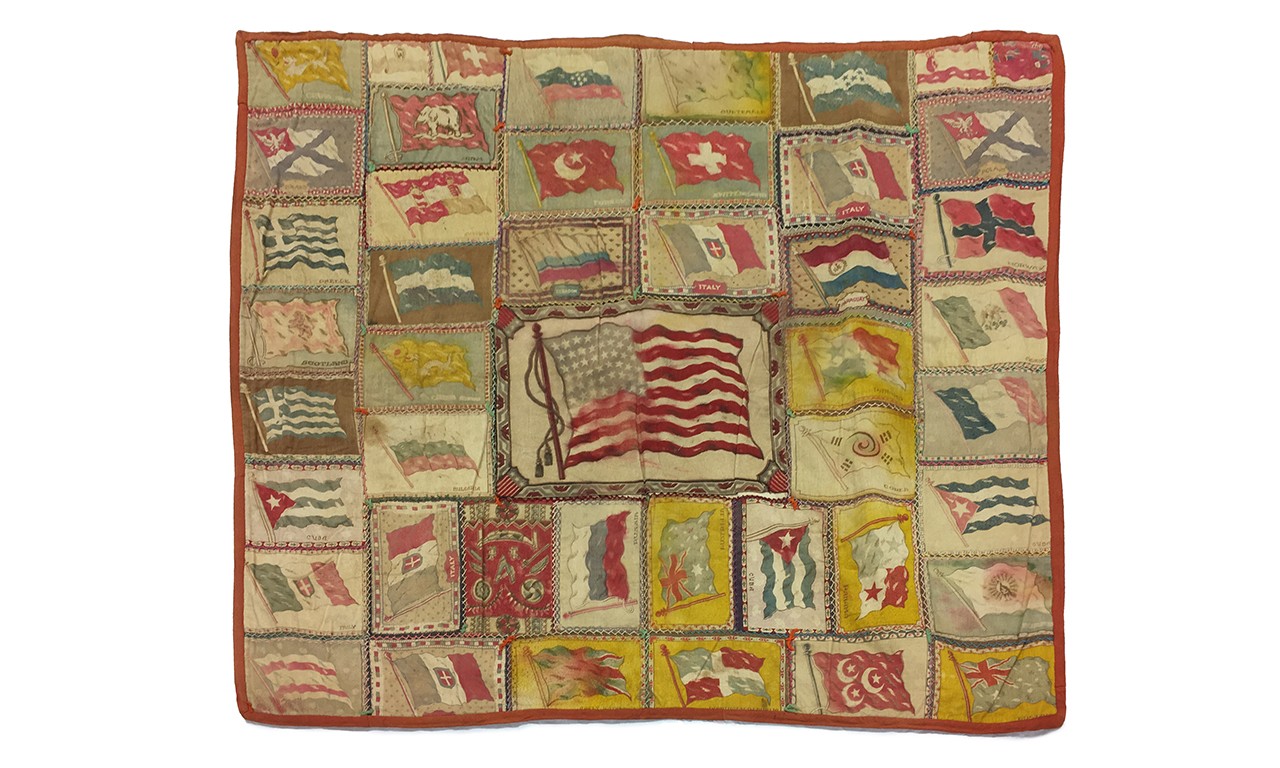 |
| Quilt, c. 1920 Maker unknown; United States Cotton, fabric and flannel; 47 1/4 x 40 1/4 in. 32147A Gift of the Fredda Barger Estate |
Murky Territory
Aside from the places we have traditionally seen the American flag since it was first introduced in 1777, it seems like every year it appears in more and more unexpected situations. In 2020 one is as likely to find Old Glory proudly adorning a government building as they are to have a family member wearing it as shorts to the annual Fourth of July party. Those familiar with American legal code will be quick to point out that in technical terms the flag itself should never be worn or festooned and using decorative likenesses is sort of a gray area, but a quick tour of Bowers objects reveals that the flag as a motif has long been used in a whole variety of ways. Today’s Fourth of July post looks at five different objects from the Bowers collections and analyzes them through the lens of their flag motifs.
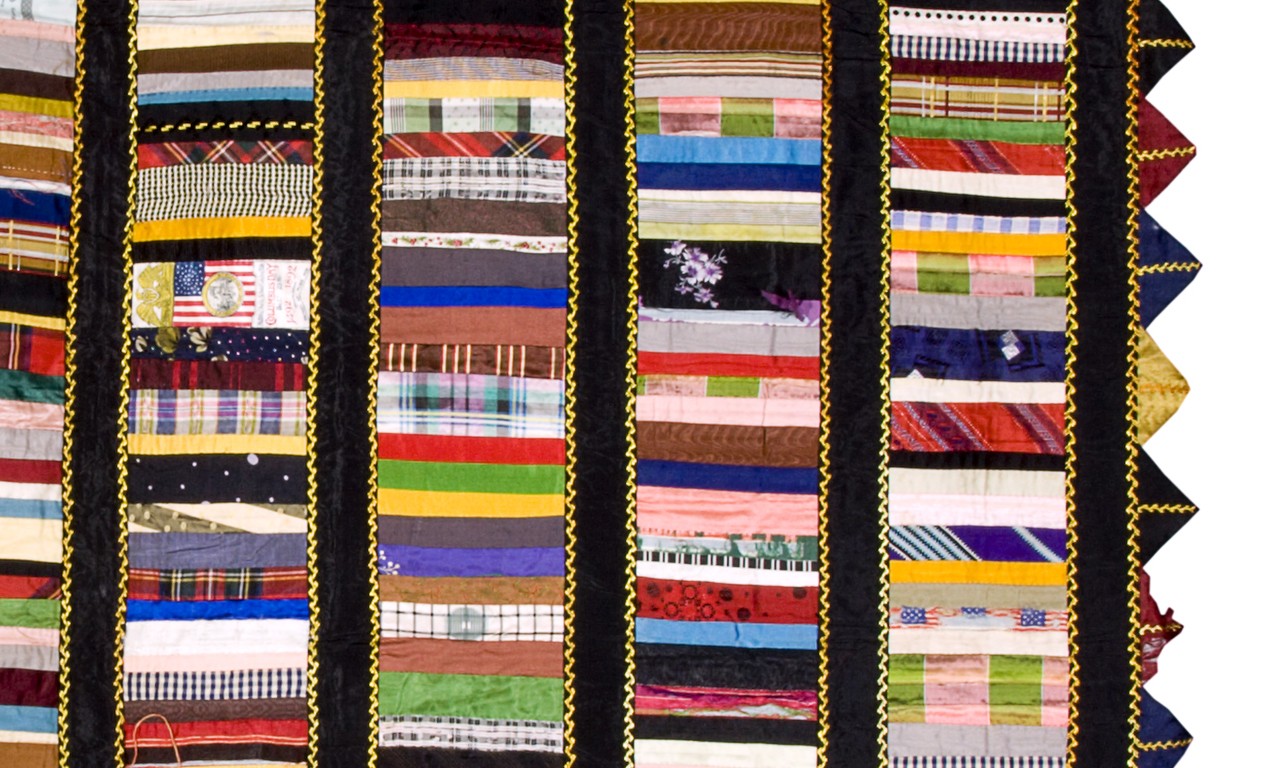 |
| Quilt with "Roman Stripe" pattern, c. 1892 Madame Schumann-Heink; La Jolla, California Silk, sateen and cotton; 68 x 59 1/2 in. 39680 Gift of Dorothy F. Sorenson |
Patchwork Americana
We begin our flag search in the Bowers quilts collection, not surprising given the degree that the craft became in many ways a uniquely American tradition. The first of the two quilts is a patchwork piece sewn together from various flannels given as premiums for the purchase of tobacco products in the early 20th century. It is worth noting that there are only 48 stars on the triple-sized American flag featured prominently in the center of the quilt. The second quilt was previously featured in Pieced Patchwork Quilt and includes many small strips of fabric, most of which are from dresses worn by Madame Schumann-Heink as a concert artist and Metropolitan Opera Star. In this detail shot we can see that not one but two of the ribbons in the dress feature American flag patterns.
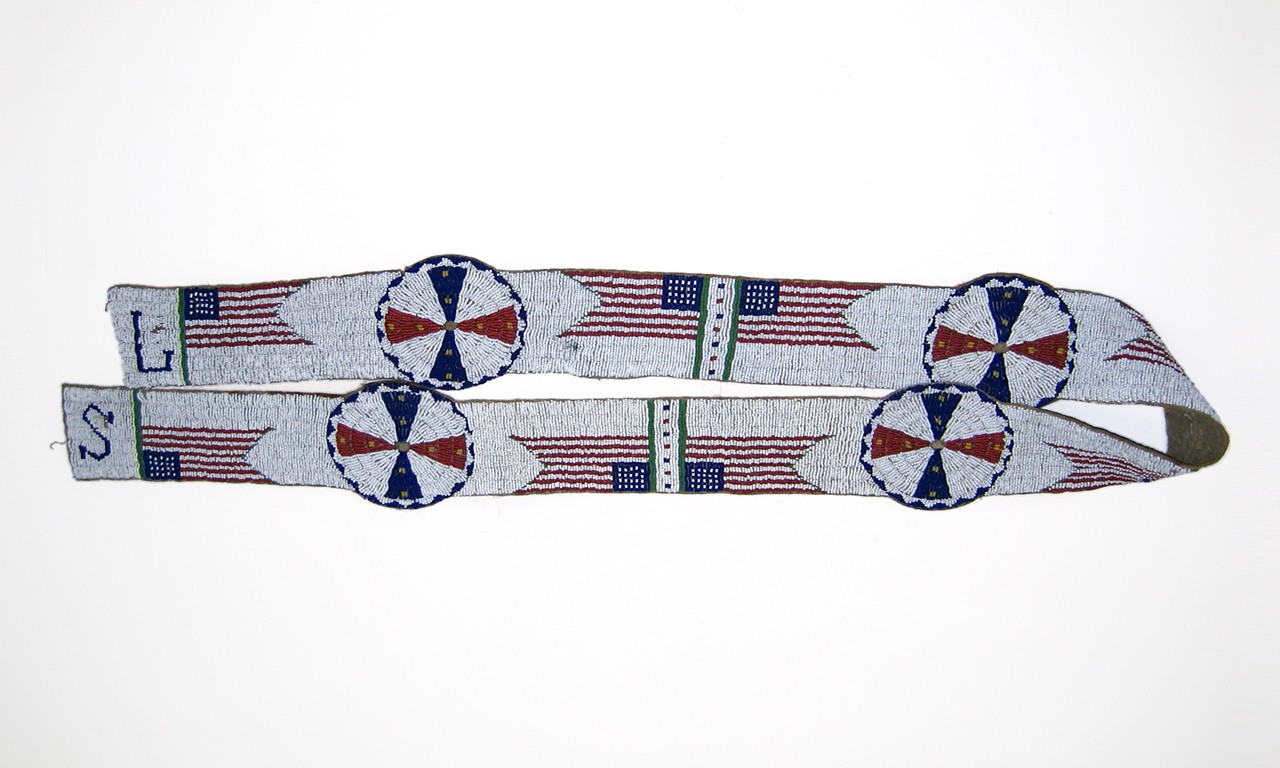 |
| Beaded Blanket Strip, c. 1880 Lakota/Dakota (Sioux) culture; Great Plains Glass beads, cotton thread, and leather; 4 x 62 1/4 in. 86.30.1 Gift of Junius & Angeline Holte |
Forming a Union
Perhaps the most unexpected object in this section was made by one of the cultures of the Great Plains around the end of the 19th century. While these beaded strips were originally sewn onto blankets and used to join sections of fabric to create robes, by the 1890s they were being created as standalone objects which previous Bowers curators explained were used in courtship. While this example features many of the usual motifs seen on Sioux and Lakota beaded blanket strips including the Cangleska Wakan or Sacred Hoop—the circular motif with spokes which denotes the interconnectedness of all things—the standard palette of white, blue and red also made it easy for the Sioux artist to include a repeated American flag motif. It is difficult to say what exactly the impetus for using the Star-Spangled Banner might have been. Certainly, this blanket strip is far from the only example which includes the American flag. The most likely explanation is a growing number of these strips were being made for purchase outside of Sioux communities.
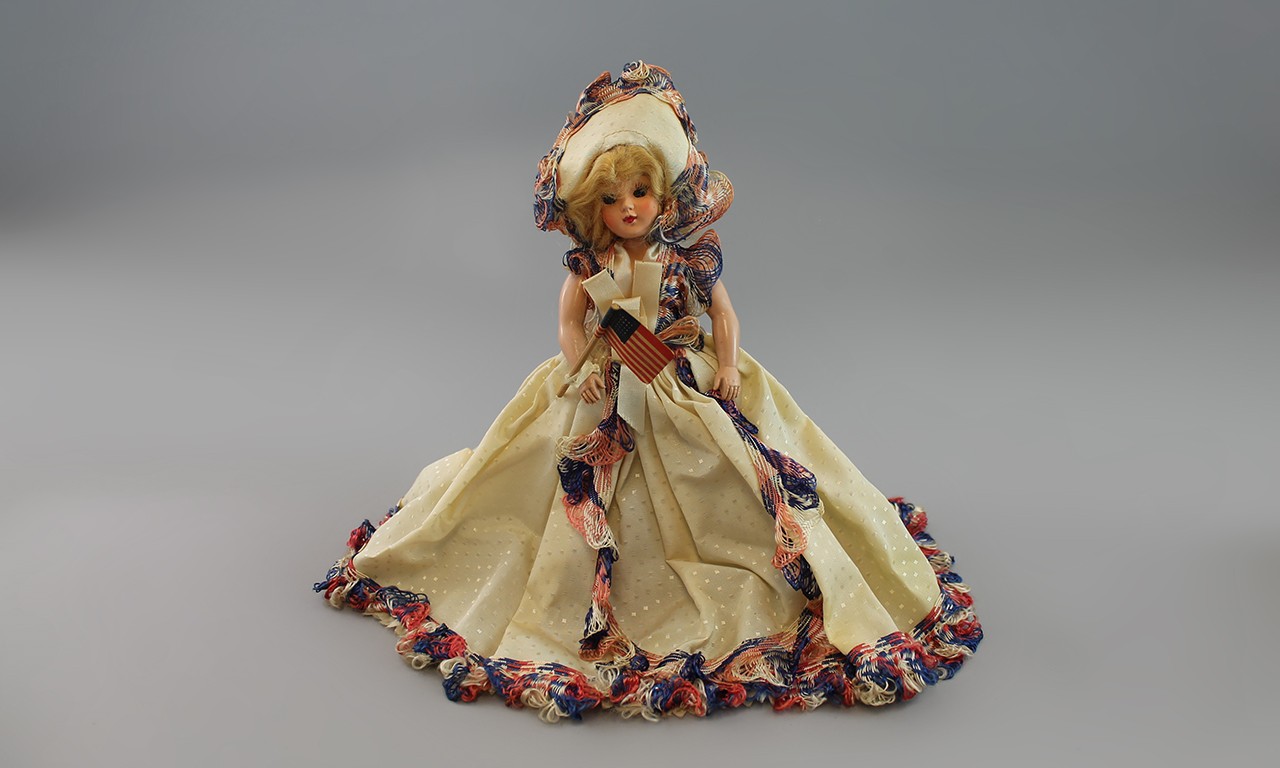 |
| Story Book Doll, c. 1950 Maker unknown; United States Porcelain and fabric; 7 1/2 in. 34770.3 Gift of Miss Judith Vormittag |
Porcelain Patriot
Whether a result of this author’s personal feelings or not, in the past three years the Bowers Blog had sparsely featured our bountiful collection of porcelain dolls. However, this post necessitated an interruption of that tendency as in looking for a selection of objects featuring American flags, this appropriately festooned doll could not be ignored. This doll comes from a group of five which the donor, Miss Judith Vormittag, played with when she was a young girl. Next to dolls of Peter Pan and a mysteriously decapitated Tinkerbell, the icon of Americana is slightly less fantastical, but it illustrates that a figure dressed in red, white, and blue held every bit the thematic value to a child of the 1950s as a beloved character from literature. Despite an inexpensive manufacture, the doll is well dressed and includes some nice details like "waking" eyes which only open when the doll is held vertically.
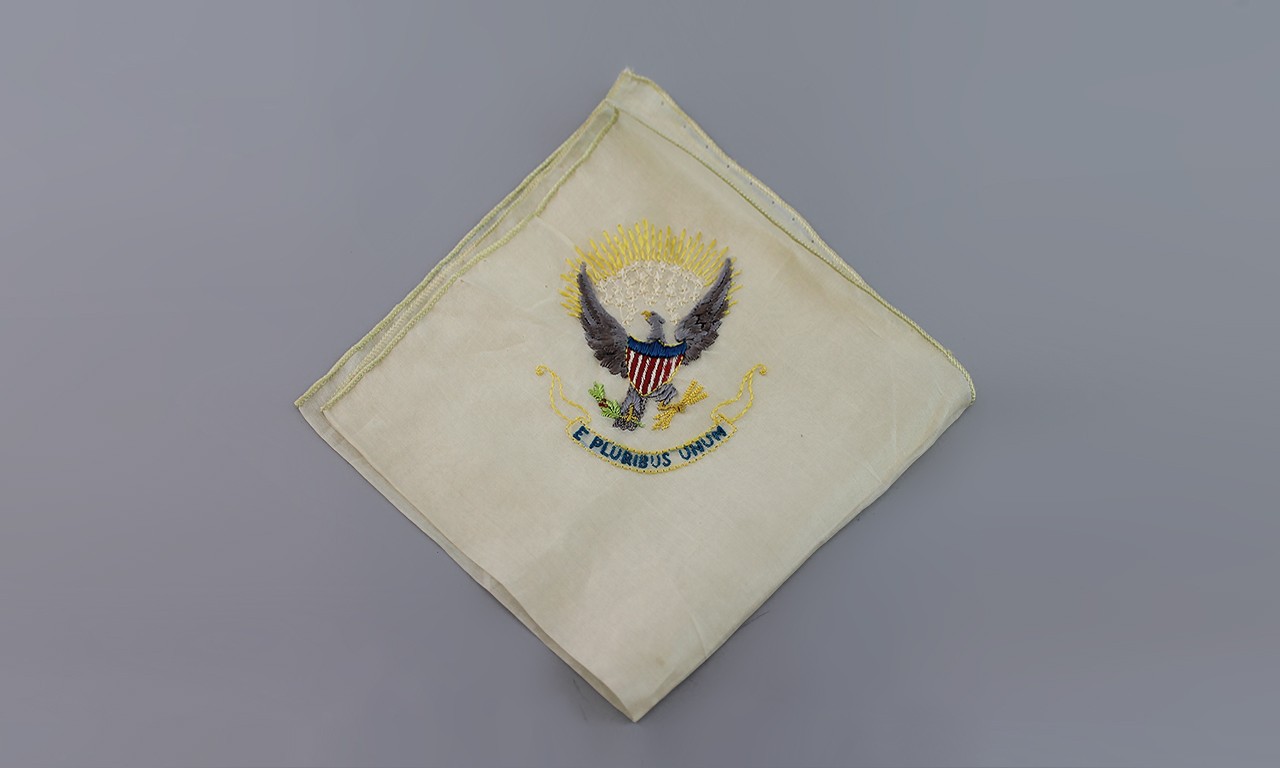 |
| E. Pluribus Unum Handkerchief, mid 20th Century Maker unknown; France Fabric; 12 1/2 x 12 1/2 in. 40626.2 Bowers Museum Collections |
Nothing to Blow Your Nose At
This handkerchief comes from a group of souvenir objects purchased in France, likely in the early postwar period when there was a strong sense of unity after Allied forces liberated the country. The other two objects in this group are a pillowcase and an apron and feature the American flag rather than the Great Seal of the United States shown here. Much like the American flag napkins we use at our annual Fourth of July celebration, though, a handkerchief is a curious object to be embroidered with a flag. If the decorated portion of the hankie were used for its intended purpose one would be blowing their nose on a sacrosanct symbol. As mentioned earlier in the post, the flag was never intended to be used as anything but a stoic icon of patriotic sentiment but since its introduction it has continued to evolve. Visually this took the form of new stars being added every time a state joined the union. Symbolically as it spread and became an icon of American identity, the flag became more and more pervasive in where it was used. The latter can be seen in these five objects, though is perhaps better illustrated by the Old Glory patterned two-piece suits on sale in stores near you. Happy Independence Day!
Text and images may be under copyright. Please contact Collection Department for permission to use. Information subject to change upon further research.

Comments